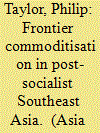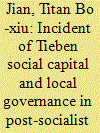| Srl | Item |
| 1 |
ID:
147454


|
|
|
|
|
| Summary/Abstract |
The articles in this special issue examine processes of commoditisation in the frontiers of post-socialist Southeast Asia. Focusing on livelihood transformations in the borderlands of Laos, Cambodia, Vietnam and Thailand, the case studies reveal how relatively understudied actors, networks, flows and conjunctures initiate and shape commodity booms. Exploring how borderlanders engage, resist, cope with and survive commoditisation, the articles chart associated changes in values and in people's relations with each-other and their environment. This introductory article contextualises this new research and discusses the implications of the findings.
|
|
|
|
|
|
|
|
|
|
|
|
|
|
|
|
| 2 |
ID:
129094


|
|
|
|
|
| Publication |
2014.
|
| Summary/Abstract |
This study makes use of the framework of social capital to explain the post-socialist governance model and characteristics of local governments in contemporary China. The incident of Tieben in April 2004 is selected as an example to explain how the local government developed social capital using informal mechanism and policy networks to facilitate economic development and to enhance government performance. thereby forming the so-called post-socialist local regime. During the incident of Tieben. the local movement collaborated with real estate developers and financial institutions. Farmers were excluded from this plan and their interests were sacri?ced. This study uses the concept of bonding social capital to explain this model. The model worked on the basis of the close relationship between specific groups rather than general trust and ptiblic participation. The majority of relevant sttitlies. on the other hated. show that instead of bonding social capital. bridging social capital is a better means to resolve the conflicts among nunicrous stib-grotips with vested interests. and to facilitate favorable economic and social performance. This paper hence contends that. although a local government may stimulate the development of social capital. the use of this governance model excites the participation and deprives cannot provide a useful guide for optimizing local government performance.
|
|
|
|
|
|
|
|
|
|
|
|
|
|
|
|
| 3 |
ID:
175476


|
|
|
|
|
| Summary/Abstract |
Post-socialist China is characterized by the loss of social and economic safety nets for workers, particularly the most marginalized. Scholars and others have assumed that informal laborers lack the associational power needed to mitigate the precarity of their lives. Drawing on ethnographic data collected between 2004 and 2016 in Chongqing, this article examines the ways in which precariously employed rural migrant men create their own safety nets by drawing on their past experiences of agricultural collectivization in the socialist era to form cooperative associations. It further explores how these men leverage cultural resources from the socialist period to retain male privileges. China’s decades of de-ideologized reforms and waves of informalization of work have not completely deprived migrant workers of the moral and symbolic resources which they use to make claims. Migrant informal laborers’ capacity for collective resistance in post-socialist times is deeply entwined with their gendered experience of work in rural, pre-reform China.
|
|
|
|
|
|
|
|
|
|
|
|
|
|
|
|